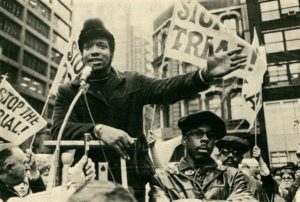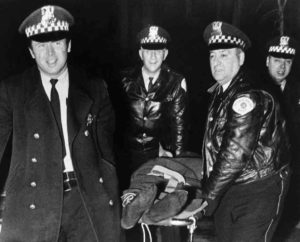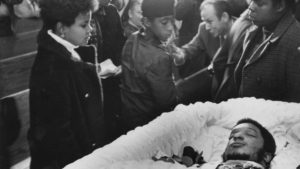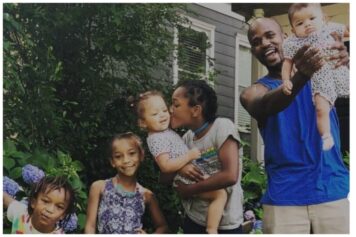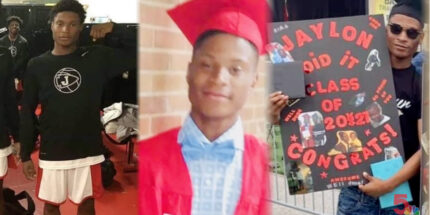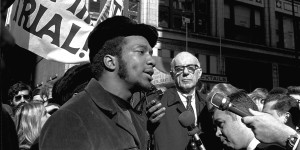
At a rally outside the U.S. Courthouse October 29, 1969, Dr. Benjamin Spock, background, listens to Fred Hampton, chairman of the Illinois Black Panther party. It was part of a protest against the trial of eight persons accused of conspiracy to cause a riot during the Democratic National Convention in 1968. (AP Photo/stf)
On December 4, 1969, Fred Hampton, the young founder and leader of the Chicago Black Panther Party, was murdered in his bed while sleeping, along with Peoria, Illinois Black Panther leader Mark Clark. Although Hampton, 21, organized the Black community and was murdered nearly five decades ago, we have much to learn from his vision, and how the government killed him and covered up his murder. Moreover, what we are witnessing today with the police in Chicago and the police in general is par for the course, as this story has been told before.
Hampton, founder of the Chicago chapter of the Back Panther Party, was a charismatic leader with a bold and broad vision for the Black community. He began a community service program, in which he provided free breakfast to school children, a free medical clinic, and political education classes.
The charismatic Panther leader also accomplished a great deal in combating violence and creating coalitions in the Black community. Hampton led a community effort to monitor and control the police. Further, in 1969, he formed a “rainbow coalition” of Black, Puerto Rican and poor young people, and in persuading the largest Chicago street gangs to put down their guns and stop fighting each other, he announced a truce among these organizations.
J. Edgar Hoover cited the Panthers’ breakfast program as the greatest threat to the internal security of the United States. The FBI chief had established the COINTELPRO program in order to, in part, “expose, disrupt, misdirect, discredit, or otherwise neutralize the activities of black nationalist hate-type organizations and groupings, their leadership, spokesmen, membership, and supporters, and to counter their propensity for violence and civil disorder,” according to FBI documents. Specifically, Hoover wanted to “prevent the rise of a ‘messiah’ who could unify, and electrify, the militant black nationalist movement.”
COINTELPRO targeted the Black civil rights and nationalist organizations and their leadership–infiltrating them and causing confusion, as well as imprisoning and assassinating their soldiers and generals. While Black people often are accused of being conspiracy theorists, we know that the conspiracy against Black people was real and documented.
Consequently, the FBI had their eyes on the Panthers and specifically, Fred Hampton. Black people empowering themselves, building and taking care of their communities, educating and politicizing themselves was not in the government’s interests. Black people ending internal violence and divisions, and most of all, regulating brutal, racist cops was not to be tolerated.
In 1969, the police raided the Panther headquarters on three occasions, and 100 members were arrested. In the early morning of December 4, the Chicago police raided the Chicago headquarters of the Panthers yet again. Claiming the Panthers opened fire, the police emptied their weapons into the apartment of Fred Hampton, killing him and Mark Clark over the course of ten minutes, and wounding four other Black Panthers. Police smiled for the camera as they removed Hampton’s body out of the bullet riddled apartment. Deborah Johnson, Fred Hampton’s girlfriend who was eight months pregnant and was in the apartment at the time, was arrested and charged with the attempted murder of the police. According to the book, The Assassination of Fred Hampton, Johnson had heard one officer ask of Hampton, “Is he still alive?” After they fired two gunshots into his room, the other officer said, “He’s good and dead now.”
What we learned is that the Chicago police worked together with the Hoover’s FBI and the Cook County state’s Attorney’s Office on a plot to murder Fred Hampton. A ballistics report found that while one bullet had been fired from inside the Panther headquarters, the police fired nearly one hundred shots into Hampton’s home. Further, a Senate Intelligence Committee investigation found in 1976 that William O’Neal, Hampton’s bodyguard, was an FBI informant who had provided the bureau with a floor plan of Hampton’s apartment indicating where his bed was located. It is also believed that O’Neal, who later committed suicide due to his role in the assassination plot, had given Hampton a sedative before the police ambush so that he would not awake. Additionally, the FBI provided the police with the information they needed to kill Hampton. According to FBI agent Wesley Swearingen, “We told the cops how bad these guys were, that the cops had better look out or their wives were going to be widows… We set up the police to go in there and kill the whole lot.”
Although the police later admitted wrongdoing, not one official, including the 14 police officers and other officials who were involved in the plot, went to prison for the assassination of Fred Hampton and Mark Clark. In 1983 there was a $1.85 million settlement paid to their survivors, which is no consolation, however large the amount was for the time. Meanwhile, the murder cost Cook County State’s Attorney Edward V. Hanrahan his career, as he was defeated in his reelection by his Republican opponent due to the support of an outraged Black electorate.
Today, there are many parallels with the circumstances and environment in which Fred Hampton operated in 1969. Still, police brutality continues to plague the Black community in Chicago and everywhere else. The Chicago police still operate as the gang that they are, reflecting a longstanding tradition of criminality, torture and corruption, with the participation of city officials. The gangland-style execution of Laquan McDonald, and the fatal shooting of Rekia Boyd and Ronald Johnson are proof that the same forces and tactics of police violence that operated in Chicago, and across the nation for that matter, are still in existence. Moreover, the official cover up and collusion we are witnessing in these and other cases, by the mayor, the police and the prosecutors, tell us that the more things change, the more they stay the same.
Further, as evidenced by the gang murder of Tyshawn Lee, 9, Chicago gang violence continues to plague the Black community. Fred Hampton and those like him provided bold, audacious leadership, realizing one could not tweak at the edges of a system, but rather bring about revolutionary change.
“If you dare to struggle, you dare to win. If you dare not struggle, then damn it, you don’t deserve to win,” Hampton said. “We ain’t gonna fight no reactionary pigs who run up and down the street being reactionary. We’re gonna organize and dedicate ourselves to revolutionary political power and teach ourselves the specific needs of resisting the power structure.”
The Black Power movement has given way to the Black Lives Matter movement, which is offering a potent critique about the police violence facing Black people, and an uncompromising approach towards the power structure in reforming the criminal justice system. The withholding of Black dollars in protest, while also supporting Black businesses, is now part of the mix. As was the case with the FBI and COINTELPRO, there are authorities today who are monitoring this new Black justice movement. Time will tell if the tactics used to disrupt the civil rights and Black Power movement will be employed to fragment and undermine #BlackLivesMatter. Learning the lessons of history, with decades of hindsight and a commitment to stay woke, will only work to the advantage of Black people who have little else to lose but their chains.
Sadly, or fortunately, should we learn this valuable lesson. The assassination of Fred Hampton has shown the Black community that with the extermination of revolutionary Black leadership, we lost our sense of unity. Instead, we opted for participation in, and accommodation with our oppression.
Not much has really changed since Fred Hampton was assassinated, as the forces of racial oppression and violence facing the Black community have not abated. However, that does not mean Black people should be sitting ducks.
What happens next, as agents of our own liberation, is up to us.
